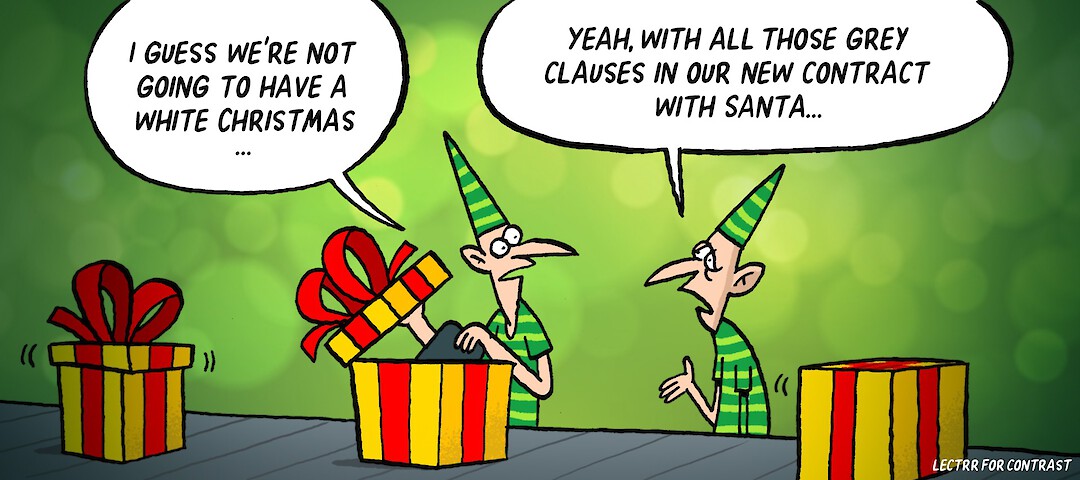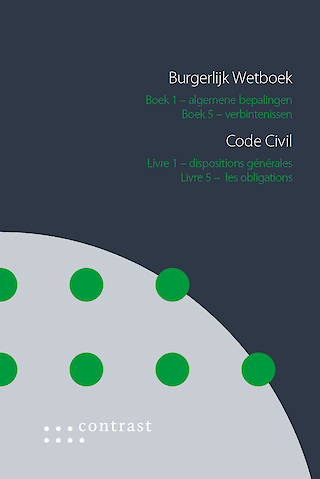In the Picture

This year, Santa wants a new B2B contract with his elves . . .
December 2020Imagine…
It´s nearly Christmas, and this year in particular Santa wants to be sure that all the Christmas gifts will be lying under everyone´s Christmas tree, tastefully arranged and right on time. Last year, Santa Claus received quite a few complaints, so he wants to conclude a new contract with his logistical network of Christmas elves.
This is how Santa sees it: a 5-year contract with strict requirements regarding the quality of both the gifts and their packaging, maintenance of his reindeer and sleigh, punctual delivery as well as an artful arrangement of the gifts under the Christmas tree. And Santa wants a damages clause for all Christmas elves who fail to fulfil these requirements. Moreover, he wants to be able to unilaterally revise the requirements every year: after all, he reasons, it is an honour to work for Santa - something certain ungrateful elves seem all too inclined to forget . . .
Santa Claus asks his lawyer to set all of this to Christmas music. And yet - as always, it seems - the lawyer objects to every good idea that Santa Claus has. This time it is because the contract Santa wants to conclude would supposedly be “unbalanced” and contain “unlawful clauses”.
Santa Claus cuts the lawyer’s disquisition short with a booming “ho-ho-ho”: but this is a contract between companies, not with consumers! So how could there possibly be storm clouds gathering in the crisp azure skies of the North Pole? Or . . . what?
A brief clarification.
On 1 December 2020, “Title 3/1. Contracts concluded between companies” in Book VI of the Code of Economic Law entered into effect. These new B2B rules apply to virtually all B2B contracts that are concluded, renewed or amended after that date.
The new law follows the example of countries such as Germany, France and the Netherlands and prohibits any clause that creates a manifest imbalance between the rights and duties of companies.
The new law translates this prohibition into a limitative black and grey list of clauses.
The black list contains four types of clauses that are always unlawful and thus prohibited:
- Those that provide for an irrevocable obligation on the part of one company, while the performance of the other party’s obligations is subject to a condition that depends exclusively on the latter’s will (irrevocable versus potestative obligations);
- Those that give a company the unilateral right to interpret a contract (unilateral interpretation clauses);
- Those that require one company to waive any recourse against the other company as soon as the latter contests such recourse (self-administered justice clauses);
- Those that irrefutably establish the knowledge or acceptance of certain clauses, even though a company could not take knowledge of them prior to the conclusion of the contract (irrefutable knowledge or acceptance clauses).
The grey list contains eight clauses that carry a presumption of unlawfulness. They are prohibited unless proof to the contrary is provided:
- Those that give a company the right to unilaterally amend the terms of a contract without a valid reason (unilateral amendment clauses);
- Those that tacitly extend or renew a limited-term contract without providing for a reasonable notice period (tacit renewal);
- Those that, without consideration, impose the economic risk on one company, although that risk would not customarily rest upon it (shifting of the risk);
- Those that inappropriately limit or exclude the legal rights of one company if the other company does not fulfil its contractual obligations (inappropriate limitation or exclusion of legal rights);
- Those that bind the parties without specification of a reasonable notice period (no reasonable notice period);
- Those that release a company from its liability for its wilful misconduct or serious fault or for its failure to fulfil the essential obligations of the contract (certain exoneration clauses);
- Those that limit the evidence on which the other party may rely (limitation of evidence);
- Those that establish damage amounts that are manifestly disproportionate to the harm suffered (manifestly disproportionate damages clauses).
The nullity of a clause on the black list cannot be disputed, but that of a clause on the grey list can. A grey clause can be salvaged if the party wishing to enforce the clause can demonstrate that it does not lead to a manifest imbalance. Thus a grey clause can be lawful due to the nature of the product or service, the specific circumstances concerning the conclusion of the contract, the commercial customs and relations, the sector involved or the coherence with other clauses. The parties would do well to justify a grey clause in the contract itself, thus making it clear that they wanted to arrive at the arrangement in question and fully accept it.
So Santa Claus had better watch out! With the new B2B rules, the Christmas elves can invoke the nullity of the damages clause and Santa’s right to unilaterally amend the contract. Santa should therefore carefully consider the level of the damages clause and its reasonableness. And he should explain why he wants to be able to amend the contract unilaterally - for example, in order to keep pace with the latest developments in the field of logistics.
Concretely:
- As of 1 December 2020, B2B contracts that are concluded, amended or renewed must be screened for unlawful clauses. This also applies for general terms and conditions that apply in the B2B context.
- Since that date there exist both “black” and “grey” B2B clauses.
- Clauses on the black list are unlawful and prohibited in any event.
- Clauses on the grey list must be justified on a case-by-case basis in order to be lawful. It is prudent to incorporate the justification for them into the contract itself as far as possible.
Want to know more?
- You can consult the Act of 4 April 2019 via this link: www.ejustice.just.fgov.be/cgi_loi/change_lg.pl?language=nl&la=N&table_name=wet&cn=2019040453, and the preparatory works via this link: www.dekamer.be/FLWB/PDF/54/1451/54K1451003.pdf.
- You can consult our In The Picture on abuse of economic dependence via this link: www.contrast-law.be/nl/publications/in-the-picture/abuse-of-economic-dependence-davids-new-weapon-against-goliath/.











